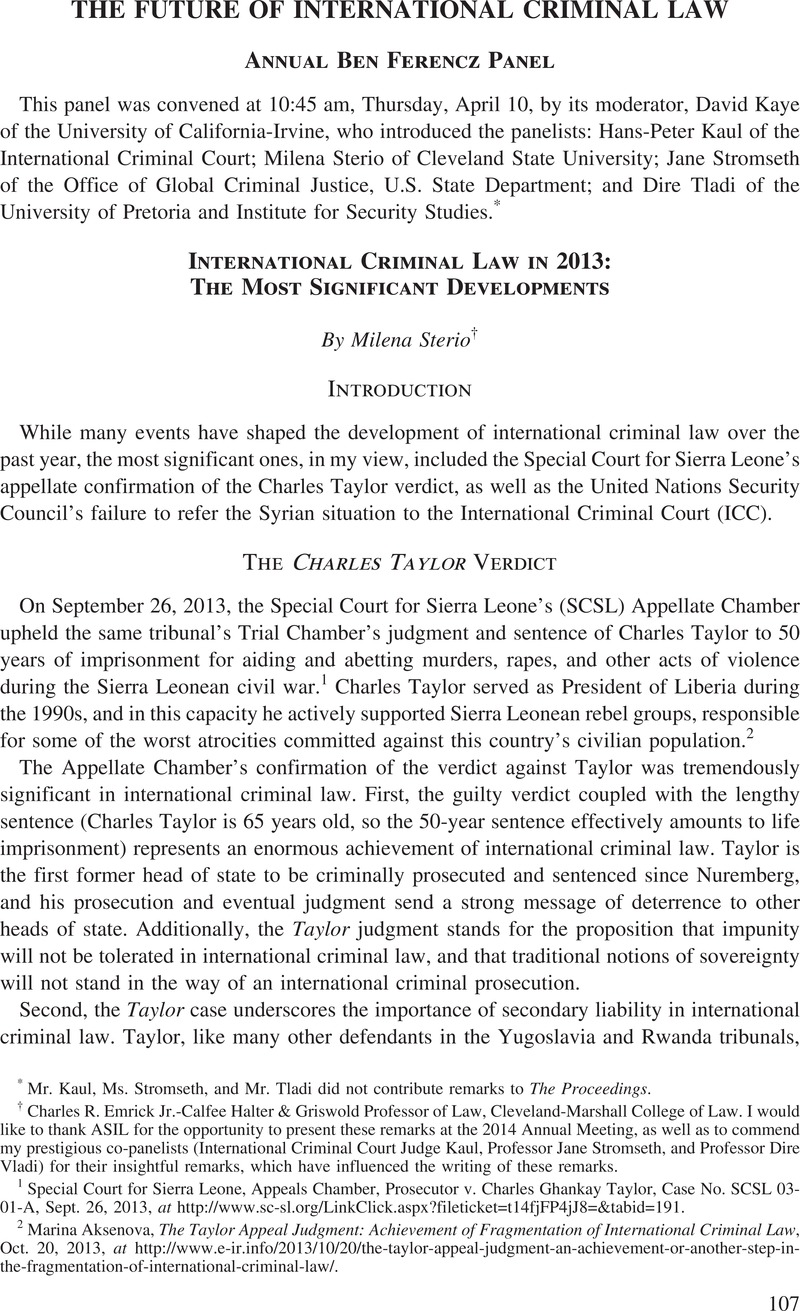No CrossRef data available.
Article contents
International Criminal Law in 2013: The Most Significant Developments
Published online by Cambridge University Press: 20 January 2017
Abstract

- Type
- The Future of International Criminal Law Annual Ben Ferencz Panel
- Information
- Copyright
- Copyright © American Society of International Law 2015
References
* Mr. Kaul, Ms. Stromseth, and Mr. Tladi did not contribute remarks to The Proceedings.
1 Special Court for Sierra Leone, Appeals Chamber, Prosecutor v. Charles Ghankay Taylor, Case No. SCSL 03-01-A, Sept. 26, 2013, at http://www.sc-sl.org/LinkClick.aspx?fileticket=t14fjFP4jJ8=&tabid=191.
2 Marina Aksenova, The Taylor Appeal Judgment: Achievement of Fragmentation of International Criminal Law, Oct. 20, 2013, at http://www.e-ir.info/2013/10/20/the-taylor-appeal-judgment-an-achievement-or-another-step-in-the-fragmentation-of-international-criminal-law/.
3 Id.
4 Prosecutor v. Taylor, supra note 1, para. 383.
5 Aksenova, supra note 2. ICTY Appeals Chamber, Prosecutor v. Perišić, Case No. IT-04-81-A, Feb. 28, 2013, at http://www.icty.org/x/cases/perisic/acjug/en/130228_judgement.pdf; ICTY Trial Chamber I, Prosecutor v. Stanišić, Case No. IT-03-69-T, May 30, 2013, at http://www.icty.org/x/cases/stanisic_simatovic/tjug/en/130530_judgement_p1.pdf.
6 Much has been written about the Perišić and Stanišić acquittals. See, e.g., Kevin Jon Heller, Why the ICTY’s “Specifically Directed” Requirement Is Justified, June 2, 2013, at http://opiniojuris.org/2013/06/02/why-the-ictys-specifically-directed-requirement-is-justified/ (approving of the ICTY’s “specific direction” requirement); but see Marko Milanovicć, The Limits of Aiding and Abetting Liability: The ICTY Appeals Chamber Acquits Momcilo Perišić, Mar. 11, 2013, at http://www.ejiltalk.org/the-limits-of-aiding-and-abetting-liability-the-icty-appeals-cham-ber-acquits-momcilo-perisic/ (criticizing the ICTY’s acquittal of Perišić). See also James G. Stewart, The ICTY Loses its Way on Complicity—Part 1, Apr. 3, 2013, at http://opiniojuris.org/2013/04/03/guest-post-the-icty-loses-its-way-on-complicity-part-1/.
7 Kelly Askin, Charles Taylor Judgment Is a Victory for Gender Justice, Guardian, Apr. 27, 2012, available at http://www.theguardian.com/law/2012/apr/27/charles-taylor-judgment-victory-gender-justice.
8 Id.
9 Id.
10 Id. (“The Taylor verdict represents a welcome and long overdue recognition that civilian or military leaders who are far from the battlefield but who support and encourage sexual violence, or make no attempt to prevent or punish it, can be held responsible for sex crimes.”).
11 Oosterveld, Valerie, Gender and the Charles Taylor Case at the Special Court for Sierra Leone, 19 Wm. & Mary J. Women & L. 7 (2012)Google Scholar.
12 Id. at 9.
13 Id.
14 Id.
15 Id. (arguing that “the Taylor trial judgment was a step forward in international gender jurisprudence.”).
16 The term “Great Powers” as used in these remarks refers to the five permanent members of the Security Council (the United States, Russia, China, France, and the United Kingdom). The term “Great Powers” has been used in other contexts to describe the G-8 countries, as well as other politically, militarily, and financially powerful nations. See, e.g., Sterio, Milena, On the Right to External Self-Determination: “Selfistans,” Secession and the Great Powers’ Rule, 19 Minn. J. Int’l L. 137 (2010)Google Scholar.
17 Syria Chemical Attack: What We Know, BBC News, Sept. 24, 2013, available at http://www.bbc.co.uk/news/world-middle-east-23927399; see also United Nations Mission to Investigate Allegations of the Use of Chemical Weapons in the Syrian Arab Republic, Report on the Alleged Use of Chemical Weapons in the Ghouta Area of Damascus on 21 August 2013, Sept. 13, 2013, available at http://www.un.org/disarmament/content/slideshow/Secretary_General_Report_of_CW_Investigation.pdf.
18 Louis Charbonneau & Michelle Nichols, U.N. Security Council Powers Meet Again on Syria; No Outcome, Reuters, Aug. 29, 2013, available at http://www.reuters.com/article/2013/08/29/us-syria-crisis-un-idUS-BRE97S17R20130829 (noting that Russia and China had vetoed three proposed resolutions that would have condemned the Assad regime and threatened United Nations sanctions).
19 Balkees Jarrah, The United States Should Support ICC Involvement in Syria, Human Rights Watch, Mar. 19, 2004, at http://www.hrw.org/news/2014/03/19/united-states-should-support-icc-involvement-syria.
20 Article 12 of the ICC Statute specifies that the court may exercise jurisdiction if one of the following States is a party to the Statute: “The State on the territory of which the conduct in question occurred….” or “The State of which the person accused of the crime is a national.” Article 12 would thus preclude the exercise of jurisdiction by the ICC in a situation like Syria, where an alleged crime occurred on the territory of a non-state party, when such alleged crimes are committed by nationals of a non-state party. Rome Statute of the International Criminal Court art. 12, at http://www.icc-cpi.int/nr/rdonlyres/ea9aeff7-5752-4f84-be94-0a655eb30e16/0/rome_statute_english.pdf [hereinafter ICC Statute].
21 Article 13(b) of the ICC Statute specifies that the court may exercise jurisdiction if “A situation in which one or more of such crimes appears to have been committed is referred to the Prosecutor by the Security Council acting under Chapter VII of the Charter of the United Nations.” ICC Statute, id., art. 13(b). The exercise of such jurisdiction by the ICC through a Security Council referral is not limited by the territoriality or nationality basis of jurisdiction specified in Article 12. See id. art. 12.
22 United Nations, Human Rights Council, 25th Sess., Report of the Independent International Commission of Inquiry on the Syrian Arab Republic, Feb. 12, 2014, A/HRC/25/65, at 1.
23 See Jarrah, supra note 19.
24 Id.
25 Id.
26 Id.
27 For a detailed description of the Bashir case, see American Non-Governmental Organizations Coalition for the International Criminal Court, Investigations & Cases, Darfur, Sudan, Al Bashir, at http://www.amicc.org/icc/albashir [hereinafter AMICC]; see Security Council Resolution 1593, Mar. 31, 2005, S/RES/1593 (2005), at http://www.icc-cpi.int/NR/rdonlyres/85FEBD1A-29F8-4EC4-9566-48EDF55CC587/283244/N0529273.pdf (referring the Darfur situation to the ICC).
28 AMICC, at http://www.amicc.org/icc/referrals.
29 Security Council Resolution 1970, Feb. 26, 2011, S/RES/1970 (2011), at http://www.onpcsb.ro/pdf/UN-SC%20Resolution%201970.pdf.
30 It should be noted that even these Security Council referrals were limited. “Both referrals imposed the entire financial burden of the new investigations and prosecutions on the court and its member countries. They also allowed exemptions for the nationals of non-member third countries should they be implicated in serious crimes committed in the referred country.” See UN Security Council: Address Inconsistency in ICC Referrals, Human Rights Watch, Oct. 16, 2012, at http://www.hrw.org/news/2012/10/16/un-security-council-address-inconsistency-icc-referrals-0. In addition, the Security Council has not actively supported the ICC in its investigations in Darfur and in Libya. Id.
31 Id.
32 Id.




